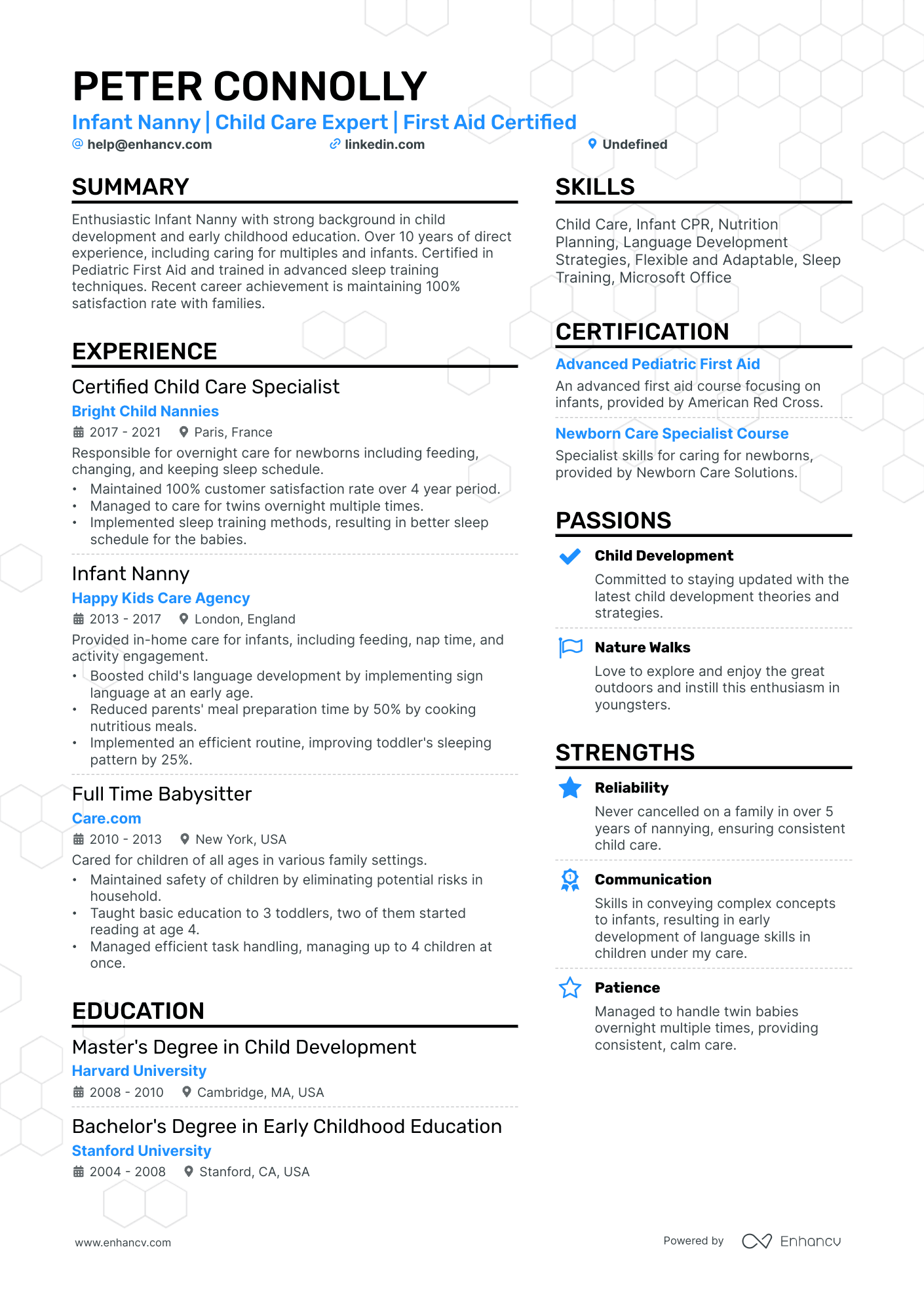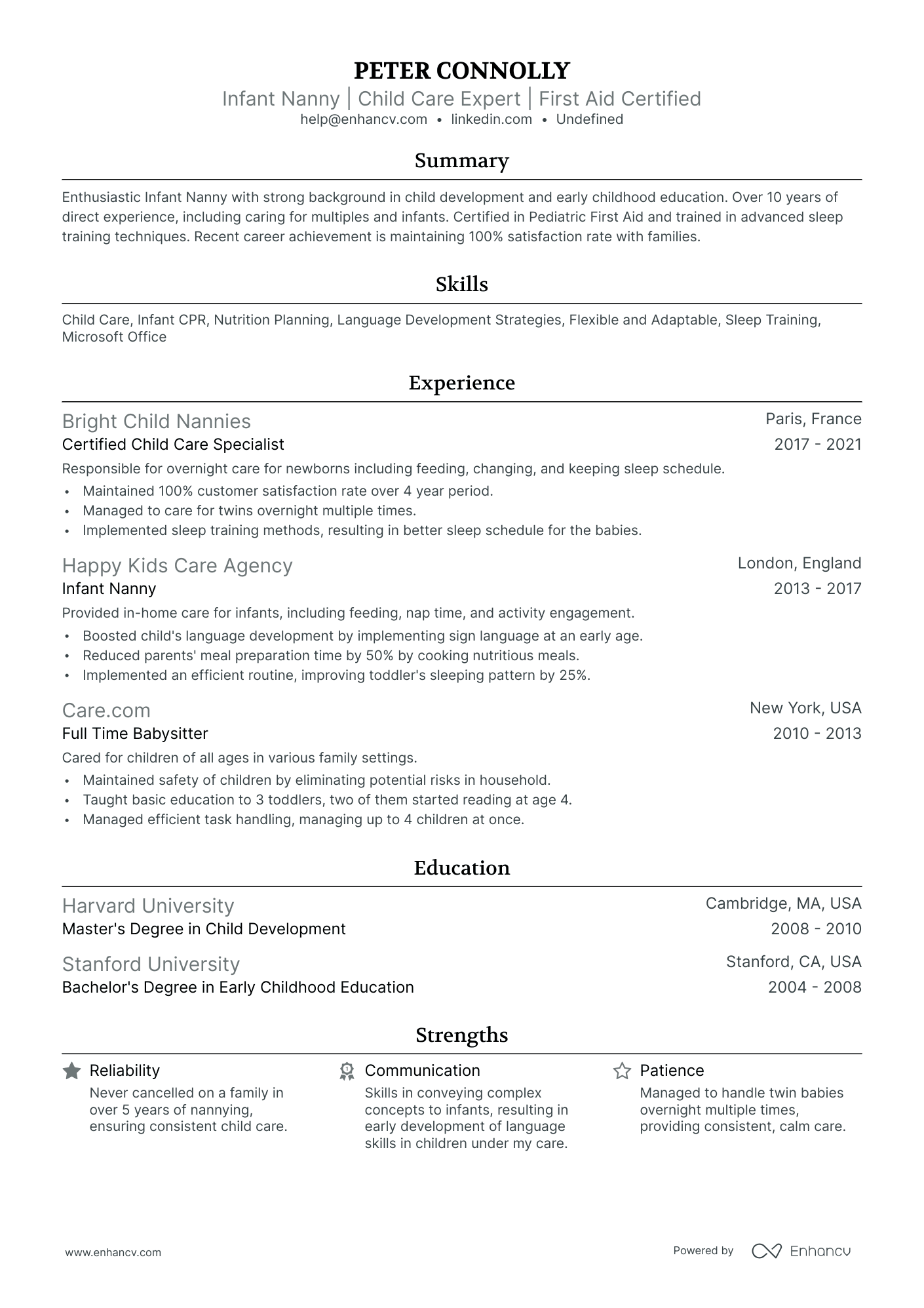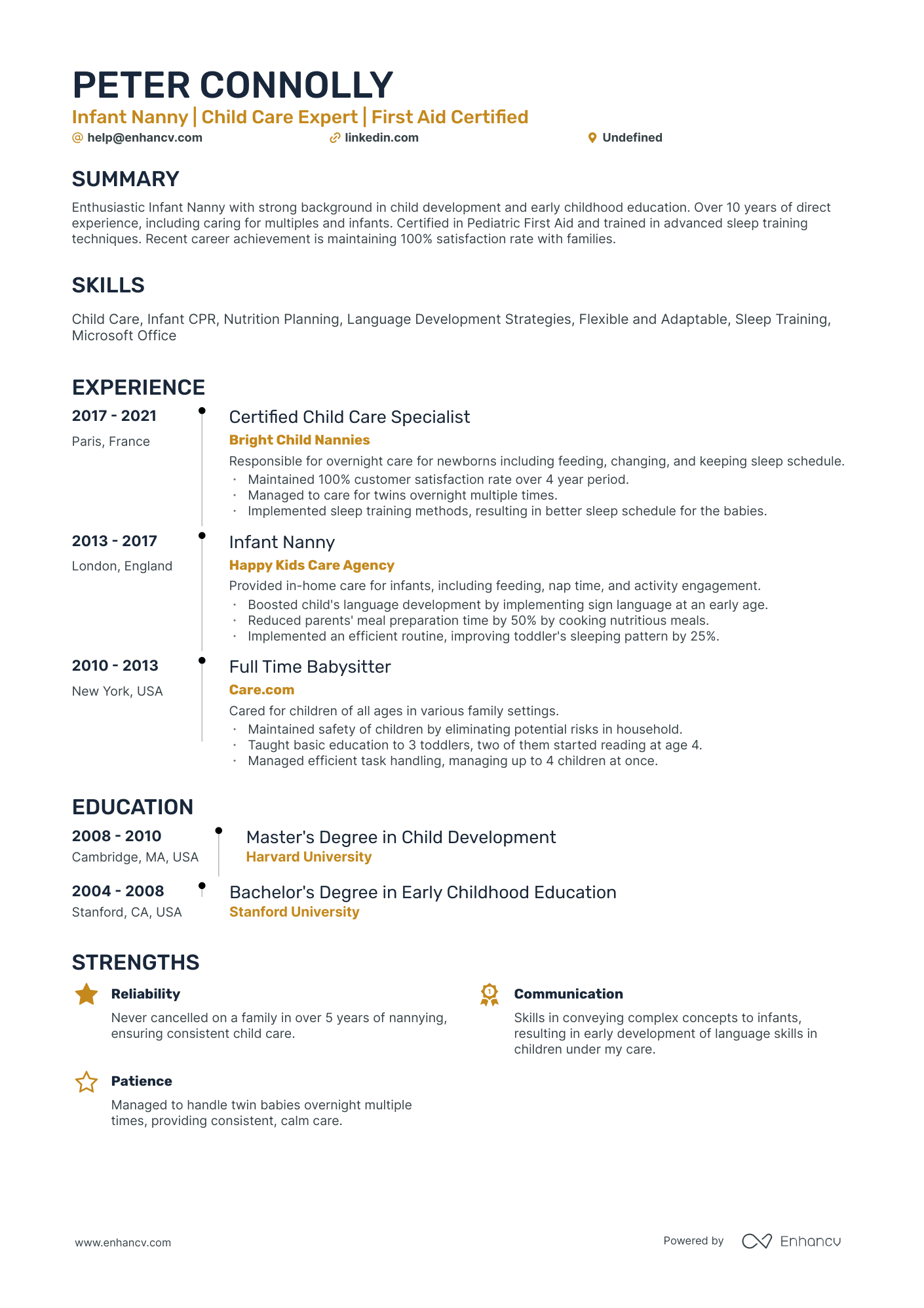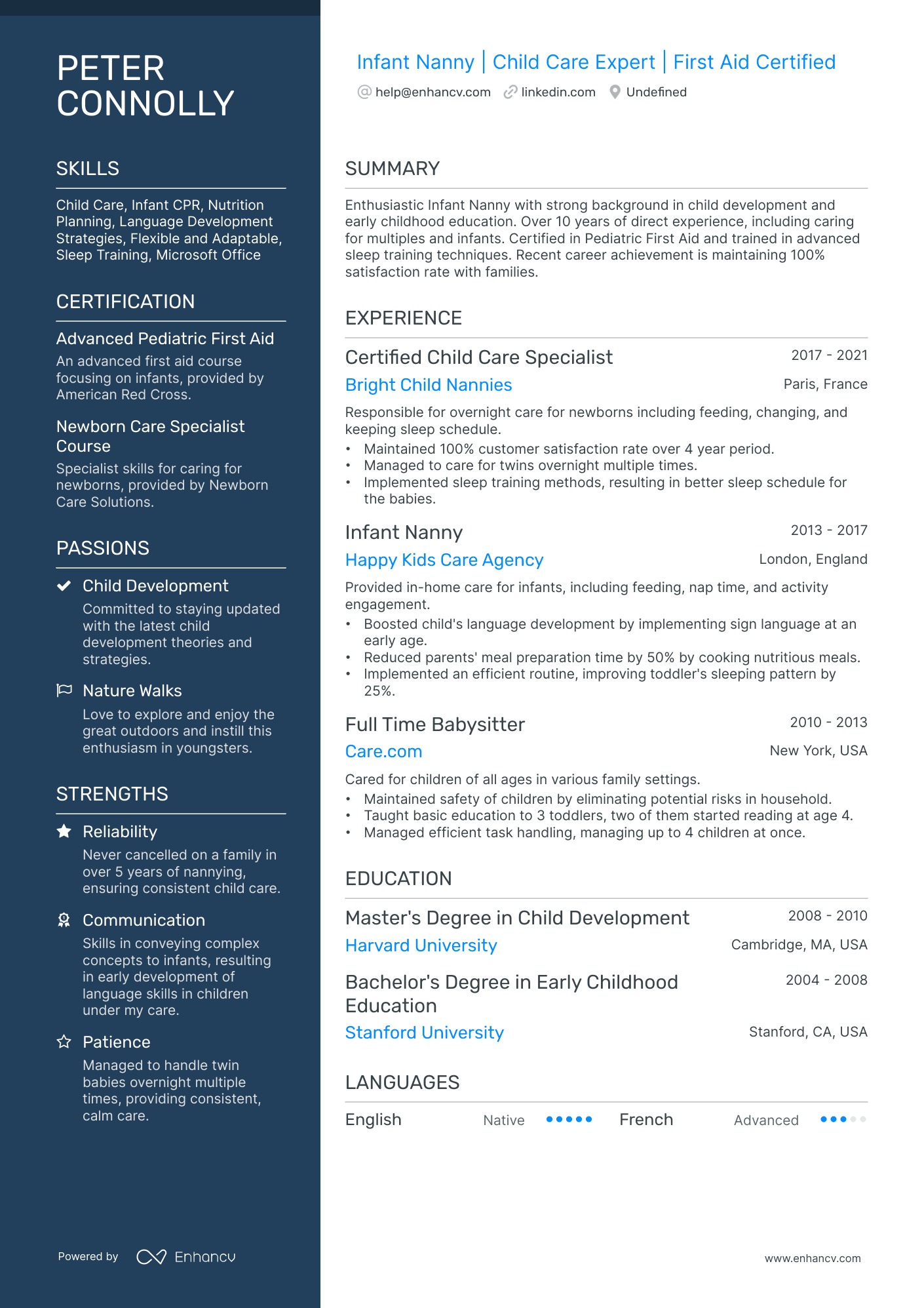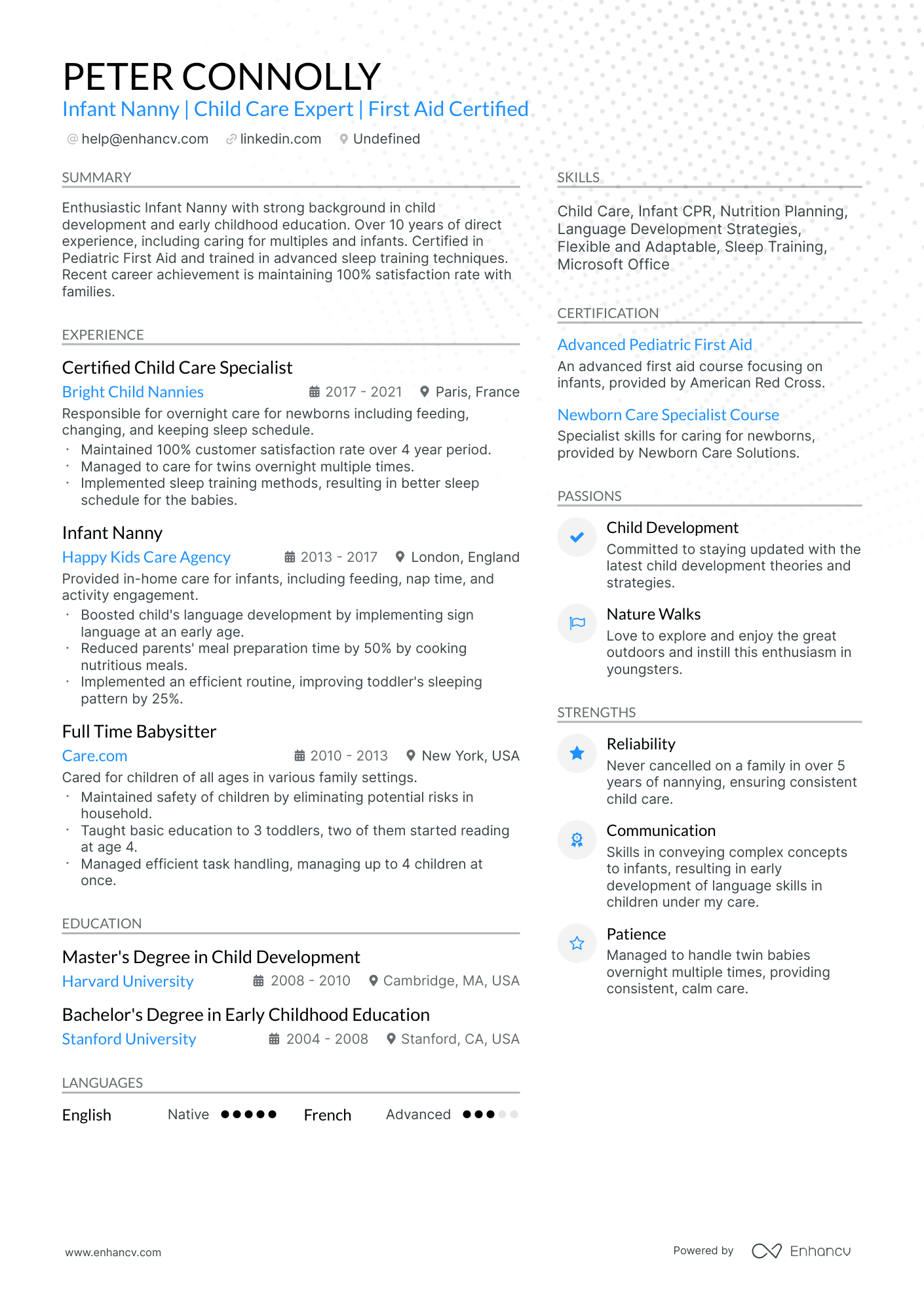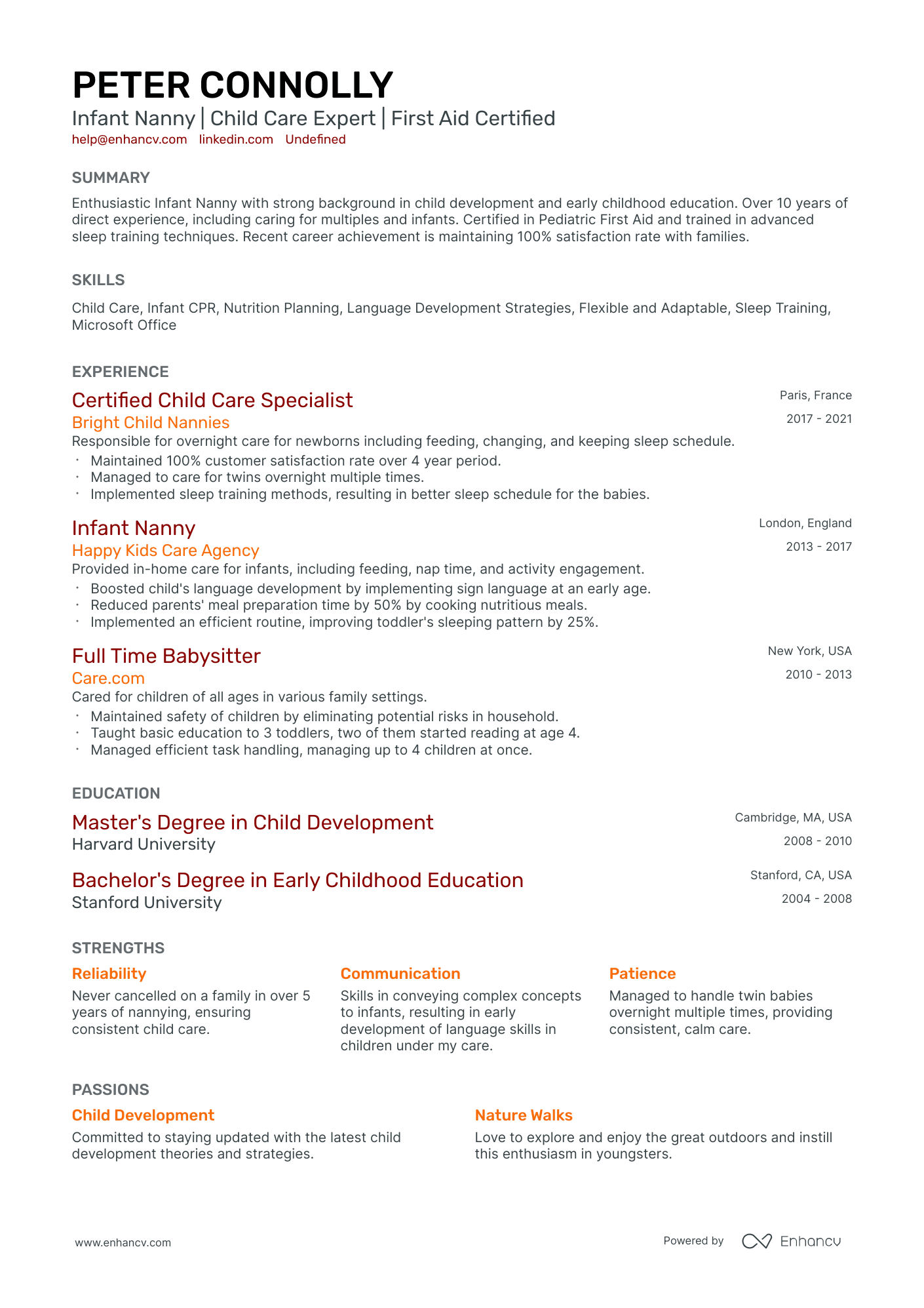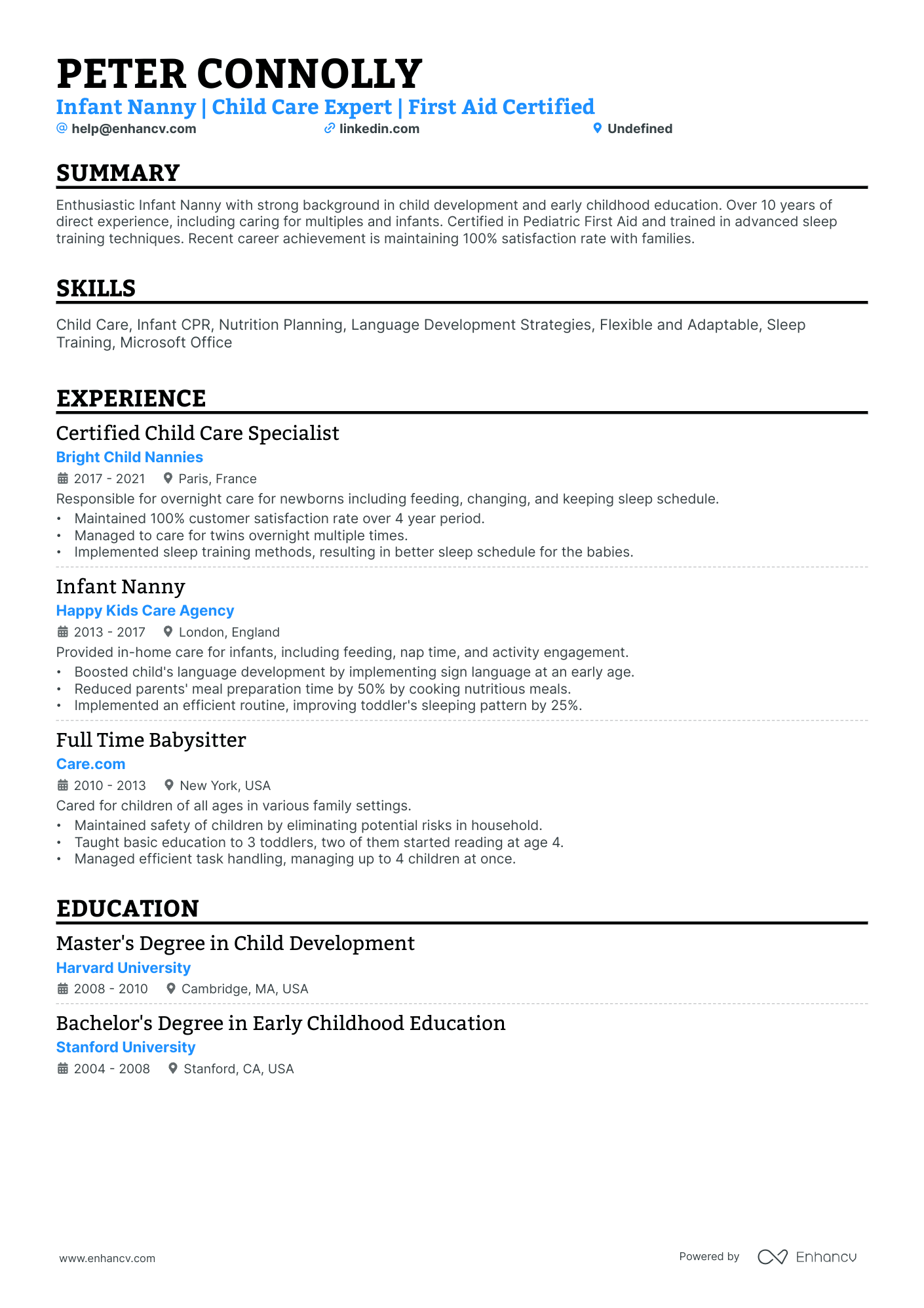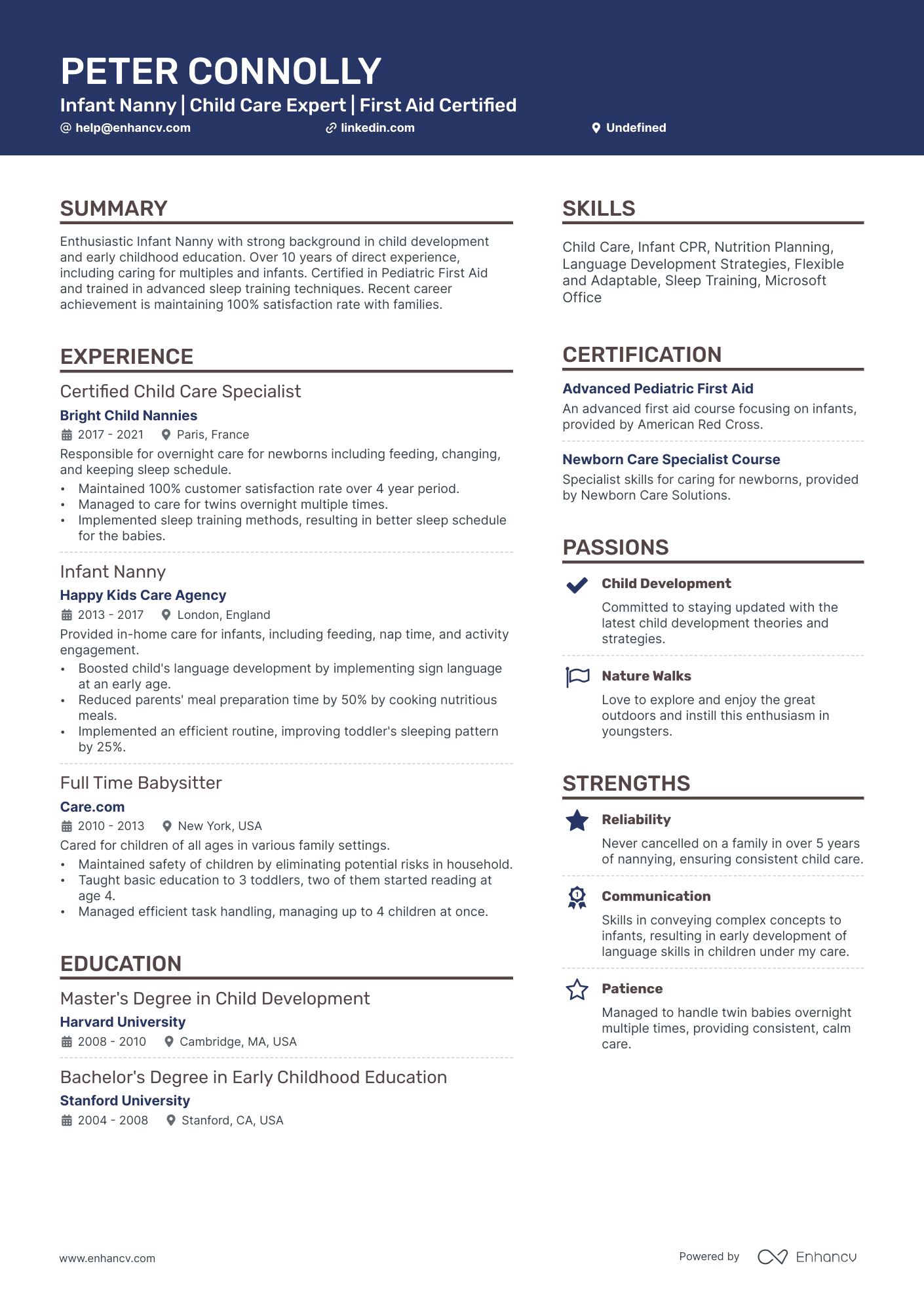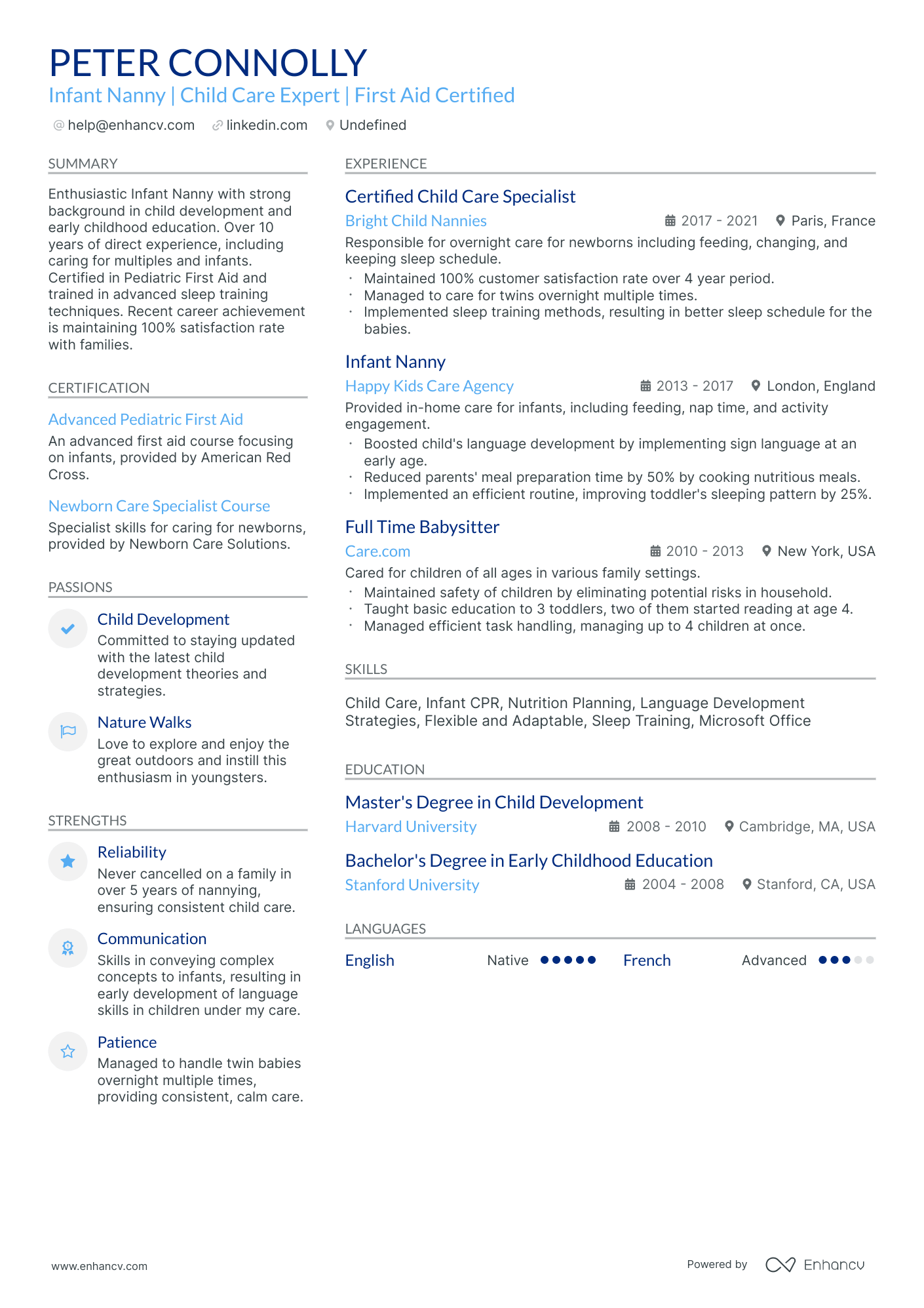Infant Nannies often struggle to present their soft skills, such as patience and empathy, effectively on their resumes. Our guide provides strategic advice on how to quantify and articulate these invaluable soft skills, demonstrating alignment with the unique demands of newborn care.
Here's what you'll read within our professional resume guide:
- Infant nanny resumes that are tailored to the role are more likely to catch recruiters' attention.
- Most sought-out infant nanny skills that should make your resume.
- Styling the layout of your professional resume: take a page from infant nanny resume examples.
- How to write about your infant nanny achievements in various resume sections (e.g. summary, experience, and education).
Recommended reads:
Simple guide to your infant nanny resume format
Successful infant nanny resumes all have something in common - candidates invest in a simple resume layout . One that is easy to read, makes a good first impression, and is adapted to their professional experience.
There are three distinct resume formats , which help you focus on different aspects of your resume. Those are:
- A reverse-chronological resume format - puts your most recent experience in the spotlight
- A functional skill-based resume format that makes your transferrable skills the center of attention
- A hybrid resume format - it combines skills and experiences.
What's more, keep in mind that your resume usually goes through an ATS (Applicant Tracker System) (i.e. the software used by companies in the hiring process).
The infant nanny resumes that suit the ATS:
- incorporate exact match keywords and skills from the job description;
- should be no longer than two pages;
- should be submitted in a PDF format, unless specified otherwise.
Upload your resume
Drop your resume here or choose a file. PDF & DOCX only. Max 2MB file size.
Pro tip
Your resume will likely be processed by an Applicant Tracking System (ATS). Ensure your header, summary, or objective incorporates essential skills required for the role.
Essential components for your infant nanny resume:
- Header: Feature your name prominently. If you have a notable degree or certification, append it next to your name. Include contact details, a link to your portfolio, and a concise headline.
- Summary or Objective: Align your professional trajectory and standout achievements with the desired role.
- Experience: Craft concise bullet points, highlighting tangible successes and contributions.
- Skills: Showcase them throughout your resume and consider a dedicated sidebar for emphasis.
- Education & Certifications: Reinforce your credibility and demonstrate your commitment to the industry.
What recruiters want to see on your resume:
- Relevant Experience: Demonstrated experience in infant care, such as previous nanny or childcare roles specifically with infants. This also includes relevant certifications like CPR and First Aid.
- Understanding of Child Development: Knowledge in infant development stages and age-appropriate activities to stimulate physical, intellectual, and social growth.
- Safety Conscious: Proven ability to create a safe and nurturing environment for infants. This can be established through child safety training or related experience.
- Excellent References: Positive references from past employers or families that can attest to their reliability, trustworthiness, and caring nature.
- Flexibility: Availability to work flexible hours including nights, weekends, and holidays, which is often required in nanny positions.
Recommended reads:
Writing your infant nanny resume experience
Here are some quick tips on how to curate your infant nanny professional experience:
- Always ensure that you quantify your achievements by implementing the Situation-Task-Action-Result framework;
- When writing each experience bullet, make sure you're using active voice;
- Stand out by including personal skills you've grown while at the job;
- Be specific about your professional experience - it's not enough to say you have great communication skills, but rather explain what your communication track record led to?
Wondering how other professionals in the industry are presenting their job-winning experience? Check out how these infant nanny professionals put some of these best practices into action:
- Provided full-time care for infants aged 0-12 months in a private household.
- Implemented daily routines and schedules to ensure optimal feeding, napping, and playtime.
- Engaged infants in stimulating activities to support their cognitive and motor development.
- Maintained a safe and clean environment, including sterilizing bottles and toys.
- Collaborated with parents to address specific needs and preferences for each child.
- Documented daily activities, milestones, and observations to track the child's progress.
- Cared for multiple infants simultaneously, ensuring their safety and well-being.
- Created a nurturing and stimulating environment to foster infants' social and emotional development.
- Established sleep training techniques resulting in improved rest patterns for the infants.
- Prepared and fed nutritious meals according to dietary guidelines and parental instructions.
- Assisted in potty training and helped develop important self-help skills.
- Organized age-appropriate outings and playdates to encourage social interaction.
- Worked closely with premature infants, providing specialized care and monitoring vital signs.
- Administered prescribed medications and assisted with medical procedures under supervision.
- Collaborated with medical professionals to implement developmental interventions.
- Supported families in understanding and coping with the challenges of caring for preterm infants.
- Created personalized routines and sensory activities to enhance premature infants' growth.
- Maintained detailed records and communicated observations to healthcare providers.
- Facilitated early language acquisition through interactive storytelling and music sessions.
- Implemented sleep training techniques resulting in uninterrupted nighttime sleep for infants.
- Designed and implemented age-appropriate sensory play activities for cognitive development.
- Provided support during teething stages, utilizing soothing techniques for pain relief.
- Collaborated with parents to establish healthy dietary habits and introduced solid foods.
- Engaged in positive reinforcement techniques to promote desired behavioral patterns.
- Worked as a live-in nanny, providing 24/7 care for newborn twins.
- Managed feeding and sleeping schedules, ensuring balanced nutrition and rest.
- Assisted in creating a calm and nurturing environment to support infant well-being.
- Coordinated with other household staff to maintain cleanliness and organization.
- Implemented baby sign language techniques resulting in effective communication.
- Supported parents in transitioning babies to solid foods and weaning from bottles.
- Provide overnight care for newborns, offering support to parents during sleepless nights.
- Establish and maintain soothing routines to promote restful sleep patterns.
- Assist with breastfeeding techniques and educate parents on proper latch and positioning.
- Monitor vital signs, including temperature and heart rate, ensuring infants' well-being.
- Collaborate with lactation consultants and pediatricians to address specific needs.
- Offer guidance on developmental milestones and age-appropriate activities.
- Supervised and cared for infants in a group daycare setting, ensuring their safety at all times.
- Designed and executed daily lesson plans incorporating sensory and motor skill development.
- Facilitated age-appropriate social interactions and encouraged sharing and cooperation.
- Administered first aid and provided immediate care in case of injuries or illnesses.
- Collaborated with parents to meet individual dietary restrictions and preferences.
- Maintained accurate records of each child's progress and shared updates with parents.
- Assisted in the care of multiples, including twins and triplets, in a private household.
- Implemented customized schedules to ensure balanced feeding, napping, and playtime.
- Supported infants in achieving developmental milestones by providing appropriate stimuli.
- Coordinated with parents to plan outings and assisted in organizing family events.
- Maintained a hygienic environment, including meticulous bottle cleaning and sterilization.
- Attended relevant workshops on multiple birth care to enhance knowledge and skills.
- Provided specialized care for infants with allergies, adapting meals and environments accordingly.
- Administered prescribed medications and monitored allergic reactions under parental guidance.
- Created an allergen-free zone to minimize exposure risks and maintain child's well-being.
- Collaborated with parents and healthcare professionals to develop allergy management plans.
- Implemented age-appropriate strategies to educate infants on self-care and allergen avoidance.
- Communicated with food vendors to ensure label accuracy and prevent potential allergen cross-contamination.
- Assisted in the care of premature infants in a neonatal intensive care unit (NICU) setting.
- Followed strict infection control protocols, ensuring a sterile environment at all times.
- Monitored vital signs and observed for any signs of distress or complications.
- Provided emotional support to parents during their infants' time in the NICU.
- Collaborated with medical staff to implement individualized developmental interventions.
- Transitioned infants from NICU to home, providing continuity of care during the process.
Quantifying impact on your resume
<ul>
Writing your infant nanny experience section without any real-world experience
Professionals, lacking experience, here's how to kick-start your infant nanny career:
- Substitute experience with relevant knowledge and skills, vital for the infant nanny role
- Highlight any relevant certifications and education - to showcase that you have the relevant technical training for the job
- Definitely include a professional portfolio of your work so far that could include university projects or ones you've done in your free time
- Have a big focus on your transferable skills to answer what further value you'd bring about as a candidate for the infant nanny job
- Include an objective to highlight how you see your professional growth, as part of the company
Recommended reads:
Pro tip
Your experience section should be a testament to your professional growth. If your career journey isn't particularly linear or impressive, focus on detailing specific skills and the tangible outcomes of your responsibilities.
How to create an impactful infant nanny resume skills section
Recruiters always care about the skill set you'd bring about to the infant nanny role. That's why it's a good idea to cherry pick yours wisely, integrating both hard (or technical) and soft skills.
Hard skills are gained through studying, are certifiable, and it's impossible to do your job without them. All in all, they show your suitability for the technical aspect of the role.
Your soft skills are those personality traits you've gained over time and most often than not - outside of the workplace. Soft skills are more difficult to quantify but are definitely worth it - as they show how you'll fit and adapt into a new team environment.
How do you build the skills section of your resume?
- Include up to five or six skills in the section as keywords to align with the advert.
- Create a specific technical skills section to highlight your hard skills aptitude.
- Read more about the culture of the company you're applying and cherry pick the soft skills you have that deserve a mention.
- Make sure you answer the majority of the job requirements that are in the advert within your skills section.
A infant nanny's resume requires a specific skill set that balances both industry-specific hard skills with personal, soft skills. Discover the most often used ones on infant nanny resumes from our list:
Top skills for your infant nanny resume:
CPR Certification
First Aid Certification
Infant Care Techniques
Baby Monitor Systems
Diapering Tools
Child Safety Equipment
Feeding Equipment
Infant Developmental Milestones
Baby Sling and Carrier Usage
Nutrition Planning for Infants
Patience
Empathy
Communication Skills
Problem-Solving
Time Management
Adaptability
Attention to Detail
Observational Skills
Trustworthiness
Teamwork
Pro tip
Sometimes, basic skills mentioned in the job ad can be important. Include them in your resume, but don't give them too much space.
Highlighting infant nanny-specific certifications and education
Your resume education section can be a treasure trove of skills and experiences relevant to the role. Here are the best practices when it comes to featuring it on your resume:
- Highlight advanced qualifications, detailing the institution and duration.
- If you're currently pursuing a degree, mention your expected graduation date.
- Consider omitting unrelated degrees.
- If your academic journey boasts significant achievements, especially in research, elaborate on them.
What's more, shocasing relevant industry certifications can bolster your credibility, even if you lack extensive work experience.
To effectively present your certifications:
- Place pivotal industry certifications prominently in a dedicated section.
- If a certification is particularly impressive, consider featuring it near your name or within the header, summary, or objective.
- Provide details, where relevant, to underscore alignment with the role.
- Recent certifications should be given advantage, as they show your up-to-date knowledge.
Both education and certification sections highlight your commitment to professional growth, a trait valued by employers. Below, explore some of the most current and sought-after infant nanny certifications to enhance your application:
Best certifications to list on your resume
- American Red Cross - CPR/AED Certification
- National Association for Regulatory Administration (NARA) - Child Care Licensing Credential
Pro tip
List your degrees in reverse order, starting with the newest. A recent PhD or unique field could set you apart.
Recommended reads:
Choosing between a resume summary or objective
Many infant nanny candidates ponder whether to include a resume summary or objective.
Here's a breakdown:
- A Resume objective outlines your career aspirations. It tells recruiters why you're applying and the value you can bring.
- A Resume summary offers a snapshot of your significant achievements, giving a quick overview of your expertise.
New professionals might lean towards an objective, while seasoned experts might prefer a summary. Whichever you choose, ensure it's tailored to the role.
For inspiration, review examples from established infant nanny professionals.
Resume summary and objective examples for a infant nanny resume
Seasoned caregiver with over 7 years of experience in nurturing newborns to toddlers. Proficient in creating engaging learning activities that promote the physical, emotional, and cognitive development of infants. Successfully managed a team of childcare professionals in a reputable daycare center, demonstrating excellent leadership skills.
Experienced nurse with over 10 years in the health-care industry now pivoting to infant caregiving. Outstanding expertise in medical procedures, safety protocols, and patient-centered care, poised to provide a high level of infant care support. Recognized for implementing innovative approaches in managing patients' needs.
Accomplished educator with a decade-long experience, transitioning into infant caregiving. Holds a deep understanding of child psychology and developmental stages, underpinned by a master's degree in Educational Psychology. Acknowledged for introducing creative teaching methodologies that fostered students' academic growth.
A dedicated and caring professional with 5 years in the social services sector, eager to transition into infant caregiving. Known for superior communication skills and a compassionate approach to supporting families in need. Awarded 'Support Worker of the Year' for exceptional service delivery in 2022.
Aspiring nanny with no prior work experience in the field, but a passion for childcare, seeking an opportunity to leverage my degree in Child Development to provide comprehensive care for infants. My goal is to ensure a safe, nurturing environment that fosters early learning and healthy growth.
Recent high school graduate with excellent childcare skills obtained from babysitting siblings and cousins. Seeking to utilize my CPR certification, strong interpersonal skills, and genuine love for children in an entry-level nanny position, aiming to provide safe, enriching care while aiding in the child's development.
Additional sections to elevate your infant nanny resume
To further differentiate your infant nanny application, consider adding sections like:
- Publications
- Projects
- Awards
- Hobbies (only if they align with the job or showcase relevant skills).
These sections can further demonstrate your technical acumen and interpersonal skills.
Key takeaways
- Pay special attention to the tiny details that make up your infant nanny resume formatting: the more tailored your application to the role is, the better your chances at success would be;
- Select the sections you include (summary or objective, etc.) and formatting (reverse-chronological, hybrid, etc.) based on your experience level;
- Select experience items and, consequently, achievements that showcase you in the best light and are relevant to the job;
- Your profile will be assessed both based on your technical capabilities and personality skills - curate those through your resume;
- Certifications and education showcase your dedication to the particular industry.
